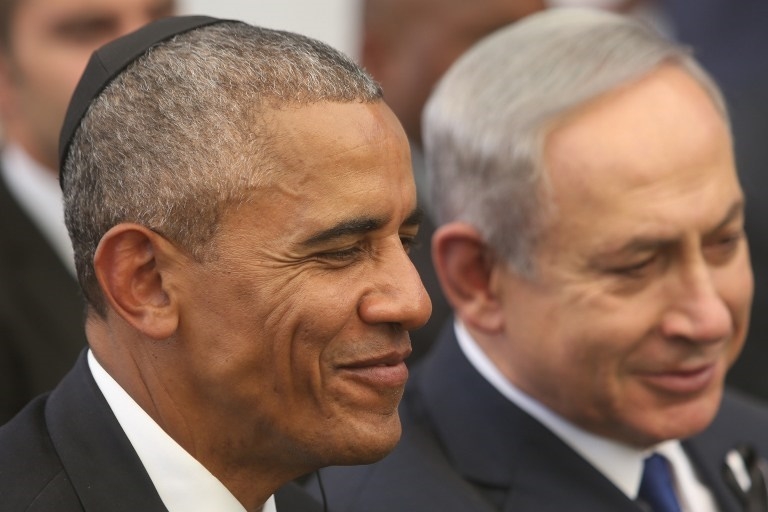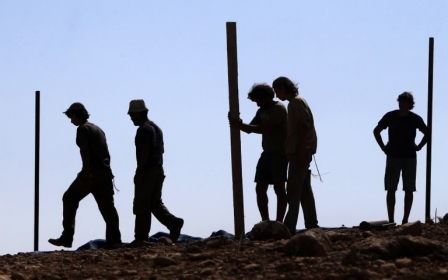UN resolution: Obama’s personal act of vengeance against Netanyahu

The United Nations Security Council's resolution on Friday denouncing Israeli settlements in the occupied West Bank came as a shock to Israel's Prime Minister Benjamin Netanyahu and his right-wing government.
Until the last minute, they had hoped that somehow, deus ex machina, Washington would veto the proposal. But the US abstained, allowing the resolution to be adopted by the 14 other council members.
It was not the first time the UNSC had passed a resolution against the Israeli occupation and its illegal policy of building and expanding Jewish settlements.
But on this occasion the resolution was much more focused. It emphasised the destructive role the settlements play in dividing and ruling the West Bank in order to prevent the establishment of a Palestinian state with a territorial continuity.
The resolution was also the first since 1980 that the US did not veto or prevent from being tabled.
The US decision to abstain reflects a long-standing policy to oppose the settlements. But it was also a personal act of vengeance and retaliation by President Barack Obama against Netanyahu. The White House put it mildly when it said Netanyahu's settlement policy was responsible for the UNSC resolution.
From Obama's first moments in the White House, Netanyahu conspired against him with the Republican majority in the US Congress. Despite being one of the most supportive and financially generous of presidents towards Israel, Obama was loathed by an ungrateful Netanyahu. The Israeli prime minister mouthed support for a two-state solution but did everything in his power to sabotage it. He also conspired with the Republican Party to derail the nuclear deal between Iran and the "P5 plus one" - that is, the five permanent members of the UNSC plus Germany.
Netanyahu's fury
Netanyahu and his cabinet, which had been taken hostage years ago by settlers who represent barely 10 percent of the Israeli-Jewish population, ignored the fact that the resolution was balanced. It called upon the Palestinians to stop incitement to violence and terrorism.
Yet Netanyahu expressed all his anger and frustration at Obama by twisting the truth and accused him of deviating from "traditional" US policy to always support Israel. The self-righteous Netanyahu convinced himself that unconditional US support for Israel is one of the Ten Commandments.
Paralysed by his fear of Vladimir Putin, whom he has repeatedly praised and described as a friend, Netanyahu totally ignored the fact that Russia also supported the resolution.
In a personal message, Netanyahu promised to ignore the UNSC resolution and retaliated by recalling Israel's ambassadors to New Zealand and Senegal, two nations that sponsored the motion.
Resolution falls short
As for the ramifications of the resolution on Israel and the Palestine, they are a double-edged sword. First of all, the resolution did not refer to chapter seven of the UN Charter, which talks about "threat to peace," and thus fell short of imposing international sanctions on Israel or its settlements.
Individual nations can use the resolution as a legal basis to justify their own decision to boycott the settlements and even Israel. But will they and to what extent? The resolution also serves as a tail wind for the BDS (boycott, divest, sanction) movement targeting the settlements and Israel.
The resolution is also a victory for the ageing Palestinian President Mahmoud Abbas and his strategy of using the diplomatic arena to combat the occupation. Abbas has recently been under tremendous pressure within his own Fatah movement and the larger Palestine Liberation Organisation to resign because his policies had failed and didn’t bring the Palestinians closer to nationhood.
But it is premature for the Palestinians to rejoice. Once he overcomes his shock, Netanyahu will most probably shift even further to the right and construct more settlements. He believes that next month, when Donald Trump enters the Oval Office, Israel will have a free hand to do what it likes.
- Yossi Melman is an Israeli security and intelligence commentator and co-author of Spies Against Armageddon.
The views expressed in this article belong to the author and do not necessarily reflect the editorial policy of Middle East Eye.
Photo: US President Barack Obama and Israeli Prime Minister Benjamin Netanyahu during the funeral of former Israeli president and prime minister Shimon Peres at the Mount Herzl national cemetery in Jerusalem on 30 September (AFP).
This article is available in French on Middle East Eye French edition.
Middle East Eye propose une couverture et une analyse indépendantes et incomparables du Moyen-Orient, de l’Afrique du Nord et d’autres régions du monde. Pour en savoir plus sur la reprise de ce contenu et les frais qui s’appliquent, veuillez remplir ce formulaire [en anglais]. Pour en savoir plus sur MEE, cliquez ici [en anglais].





